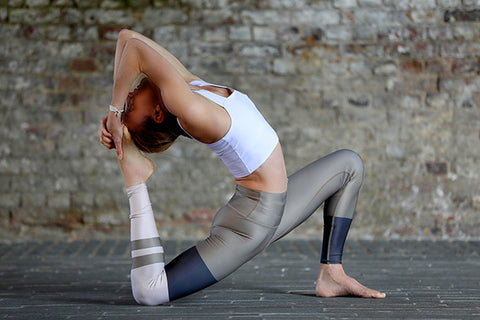YIV: How were you first introduced to yoga? Why have you continued to practice?
AI: I took my first Yoga class in 2007, mainly out of curiosity. I tried a Yoga class while on holiday and decided to continue once home. I felt right away that it was much more than a physical practice. I wanted to learn more and more, to know all the poses. I soon discovered the philosophy behind it and decided to study it. I never looked back. It was the philosophy that attracted me the most and it is still what is keeping me drawn to Yoga. It became a complete part of my life and soon a way of living.
YIV: When did you go vegan? Why did you make the decision to do so?
AI: I first became vegetarian in 2012. It happened quite easily because I never really enjoyed eating meat. It is when I did my 500-hour teacher training with Sri Dharma Mittra in New-York in 2017 however that a bigger change happened. We had to follow a special diet for four months to calm our mind, which was strictly (and stricter than) vegan. From then on, gradually I became vegan. I see it as an act of compassion towards the animals, as a way of saving our planets and of being healthier.
It is easy to justify my decision.  When you realize the great suffering you are participating in, allowing and supporting when you eat meat, dairies, fish, it is no longer possible to continue eating them. There is also a simple question I asked myself: would I kill the animal myself to eat the meat? I never would. I would always look for an alternative way of nourishing myself. And so this is what I do.
When you realize the great suffering you are participating in, allowing and supporting when you eat meat, dairies, fish, it is no longer possible to continue eating them. There is also a simple question I asked myself: would I kill the animal myself to eat the meat? I never would. I would always look for an alternative way of nourishing myself. And so this is what I do.
YIV: Why is do you think yoga is vegan?
AI: ’Yoga is vegan' is in line with the first rule of Yoga, the first Yama, which is Ahimsa, non-violence and love towards all beings, including animals. It is an act of compassion. It is ceasing to participate in the killing of animals. It also contributes to protecting our planet and our children's future as cattle-breeding has a great impact on greenhouse gases emissions and therefore global warming.
The practice of Yoga increases our awareness. Veganism for me coincides with greater awareness of the way we live our lives, the impact we have on the planet. Veganism is directly linked to Yoga philosophy.
YIV: As a teacher, do you ever introduce the concept of ahimsa or veganism to your students? If so, how has it been received?
AI: In public classes I talk about Ahimsa from time to time but in broad terms. I regularly have conversations about veganism with my regular students however. I am careful in the way I talk about it and of not imposing anything on anyone. I give my point of view and my reasons. Some of my students have switched to a vegan diet, some won't change their minds at this point. But I think everyone evolves at their own pace and if you impose your views in a forceful way, it has the opposite effect.
YIV: What advice would you give to a yoga student who wants to become vegan?
AI: I would advise them to make sure that they eat enough and in a healthy way because it's not because you are vegan that you eat properly! I would advise them to make sure they eat a variety of vegetable but also beans, lentils, chickpeas... and eat unprocessed food as much as possible. I would advise them to read about it and buy a good vegan cookbook to give them ideas about recipes. I would also talk to them about taking some B12 supplements.
YIV: Do you have a favorite vegan recipe you would like to share? If it's not your own, please credit the author.
AI: I love cooking pearl barley, adding some coconut cream in it and mixing it with all kind of vegetables (tomatoes, asparagus, broccoli, spinach or chard, carrots, or anything you have in your fridge that would combine well with it). I often add tofu and squeeze a lemon on it. It is so easy to cook!
YIV: Where do you love to go for vegan food?
AI: I live in London and I love to go to Wulf & Lamb on Pavillion Road close to Sloane Square and Tell Your Friends on New King's Road in Fulham.
-Alix Inness
Website: alixyoga.com
Instagram: Alix_Yoga
Facebook: Alix Yoga
